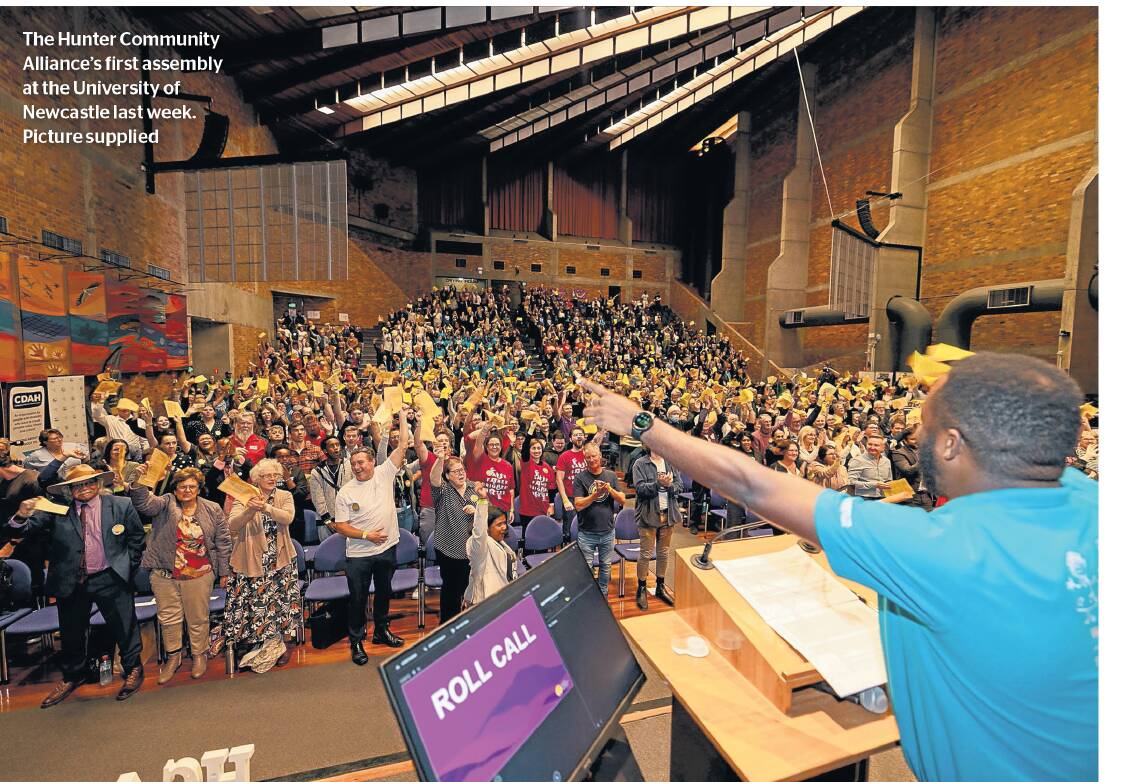
Sitting in the great hall of the University of Newcastle among the 800-strong crowd of enthusiastic supporters of the Hunter Community Alliance (HCA) at their founding assembly, I felt an almost 'church revivalist meeting' atmosphere.
There was a strong local church presence, particularly from the Catholic and Uniting churches. Indeed, there were some prayers, testimonies, and inspirational music: "We have the chance to turn the pages over." A charismatic pastor from the Uniting Church added a Billy Graham touch to proceedings.
More than 30 Hunter groups attended the two-hour meeting: four unions, eight churches, 14 community support, and four climate action. Each group leader was given a minute to explain why they were joining HCA. Some powerful statements were made. A Uniting Church pastor said: "We are standing for the marginalised in our community."
All these organisations have agreed to join and support the HCA formerly and backed this with subscriptions. This is to advance the interests of the much-neglected Hunter by advocating for government policies that will enable the region and our people to thrive, such as the long-promised, but still moribund, Hunter Transition Authority.
The HCA has done widespread research, which primarily involved 'listening' to the grassroots and identifying issues troubling the people of the Hunter. What stood out were concerns about housing and homelessness, the environment, and the greater need for industrial training. Policy questions were then sent to ministers well in advance. They were invited to speak and be accountable at the meeting because the chair said: "Decision-making is behind closed doors, and it needs to be out in the open".
Two ministers took part. Rose Jackson, NSW Minister for Housing and Homelessness, and Chris Bowen, the federal Climate Change and Energy Minister.
After they spoke, the chair put the speakers on the spot by restating the HCA's "policy asks" that fell into their remit, and then tallied the ministers on a simple list of "yes", "no", or "considering it".
Jackson was most impressive, and certainly won on the 'clap-o-metre', even though she had the most difficult task, with 2000 homeless people in the Hunter. She was honest and admitted that the solutions to the housing crisis were long-term, but assured the meeting that it was at the top of the NSW government's agenda.
Jackson led with her strong suit by appealing to the sentiment of social justice in the room. The minister recounted that her first action was to end the previous cruel, longstanding government practice of aiding the homeless for a limited time and then making the most disadvantaged in the community apply to the bureaucrats for help all over again. She used this example to point out the limits of a cabinet minister's power. That matter was her decision alone; however, in relation to the housing crisis, she did not have sole authority. The Minister for Planning, the Treasurer, and the Premier also have a big say, as does the entire cabinet and caucus.
These key decision-makers must consider the broader picture. Requiring developers to allocate too high a percentage of new unit development to affordable and social housing may have unintended economic consequences. We have probably seen the effects of such a connection in Newcastle.
For the last two stages of the Honeysuckle development, the housing component has already been handed, retrospectively by the Minns government, a 30 per cent affordable and social housing requirement. The whole remaining Honeysuckle site has gone quiet - nothing is happening. If government regulation makes it even more difficult in a stressed market, the investors will walk away, exacerbating the housing crisis.
The Greens party now has a focus on housing. Abigail Boyd, MLC, spoke at the HCA meeting in the great hall, saying, " Yes, yes, yes" to everything that was asked of the government in the housing space. But as a minor party, the Greens will never have a chance to implement government policy. This is just as well, because, if adopted, their housing policies are more likely to scare off investors, making the current housing crisis worse.







